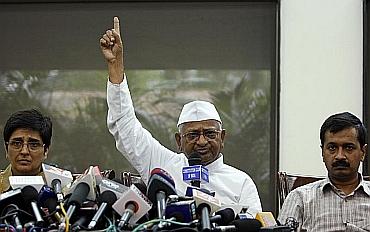
Sheela Bhatt traces how Parliament's Standing Committee on the Lokpal Bill is giving final shape to its report, finds out what the key clauses could be and discovers the political difficulties in finalising a complex legal issue before the winter session ends.
The report of Parliament's Standing Committee on the Lokpal Bill is unlikely to be unanimous.
According to sources, the Bharatiya Janata Party is planning to attach its dissent note on certain issues. The BJP's final stand on the issue will be decided by party members in consultation with Arun Jaitley, the Leader of the Opposition in the Rajya Sabha, on or around November 23.
Congress members consider this a political move by the BJP to ensure that Kisan Baburao 'Anna' Hazare's movement does not die down and the issue of corruption stays alive.
Congress General Secretary Rahul Gandhi's suggestion that the Lokpal be made a Constitutional entity has been accepted by members of the Standing Committee, claims a senior Congress member of the committee.
Dr Abhishek Manu Singhvi, chairman of the Standing Committee, is racing against time to complete his report and table it in Parliament during the ongoing winter session.
The committee's final two meetings are scheduled on November 24 and 25. Dr Singhvi's team expects to release its the report in the first week of December. The lawyer-MP needs to be credited for the swift pace with which the committee -- that normally takes nine months to a year to debate such sensitive and complex issues -- has undertaken this exercise.
Please ...
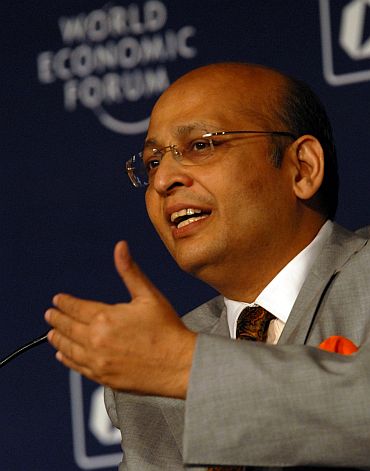
Although the BJP is likely to attach a note of dissent, so far none of the Standing Committee's members have expressed any firm opinions during the committee's meetings where all issues are being debated threadbare.
Hazare's Team Anna has presented its case twice before the committee. Its members took nine hours to explain its position to the MPs.
Kisan Baburao 'Anna' Hazare has threatened to go on another fast if the winter session of Parliament fails to pass the Lokpal bill. Says a Congress MP, "We are not here to please anybody. Nobody can pass the bill that a few individuals want. We are here to debate seriously and we are trying to arrive at a consensus."
Dr Singhvi told Rediff.com, "The entire exercise is to control medium and big ticket corruption."
"We hope and trust that we will get some constructive cooperation," he adds, "and we will be able to complete the challenging task within the earliest possible timeframe."
The Standing Committee, which consists of 31 MPs from 12 political parties, has done some remarkable work on the highly complex legal issue of the Lokpal, notes a member of the committee.
In the last six weeks more than 120 people have provided their opinion before the committee at more than dozen meetings.
Top Indian media institutions, including the Editor's Guild of India, has told the committee that its should not be covered by the Lokpal.
Non-government organisations also want to ensure that the Lokpal should not curb its freedom, unnecessarily. The judiciary and the grievance redressal system will be kept out of the Lokpal's purview.
The government is proposing that state Lokayukta Acts are on the same lines as the Lokpal Act.
Please ...
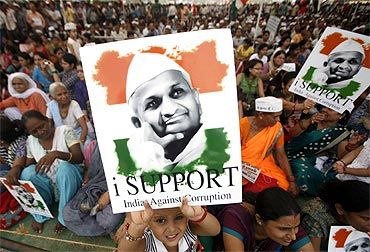
If the government-drafted Lokpal bill is passed, then the most important step forward in the fight against corruption through this exercise will be the removal of certain clauses that obstructs the Central Bureau of Investigation from taking on corrupt officials in the government.
According to a member of the Standing Committee, Section 6A of the Delhi Police Establishment Act, which requires the CBI to take the central government's permission to investigate and prosecute officers above the level of joint secretary will be removed.
More significantly, Section 19 of the Prevention of Corruption Act that makes it mandatory for state investigators to take previous sanction for prosecution will also be dropped. This section was to protect honest officers from any harassment, but it is often misused by dishonest officers and sanction is delayed by the competent authority.
Due to Section 19 the sanction of the competent authority is necessary before any court takes cognisance of the offences defined under Sections 7, 10, 11, 13 and 15 of the Prevention of Corruption Act. If this section goes, it will be celebrated by leaders of the anti-corruption movement in the country.
The Standing Committee has decided to include Class A and Class B government officers (who number 80,000 and 175,000 respectively). Employees of the Indian Railways and Public Sector Units will also be under the Lokpal's jurisdiction.
The lower bureaucracy has not been included, and Team Anna has issued media statements against this exclusion.
A member of the Standing Committee told Rediff.com, "You should catch people who are prone to be corrupt." People who make frivolous complaints will be fined Rs 5,000 and could even get six months in jail."
Please ...
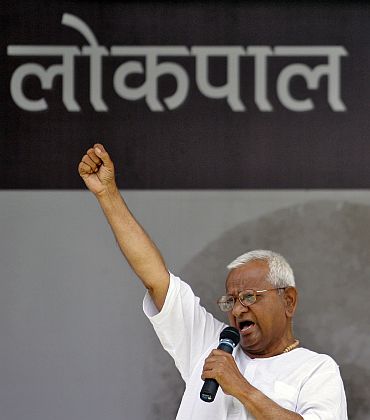
The formula to investigate and prosecute corrupt government employees and officers will be something like this: The government is proposing that any citizen can complain to the Lokpal or let the Lokpal take up a case of corruption against the government officer belonging to Class A or B suo moto.
The nine-member Lokpal panel will then weigh the evidence against the official. If prima facie evidence is found against the official, then the Lokpal will refer the case to the CBI.
Neither the Lokpal nor the Union department of personnel and training (which funds the CBI and has administrative control over it) will have any say on the merits of the investigation.
The Lokpal cannot go into the merit of the investigation to keep the CBI independent!
After investigation, the CBI will give its report to an independent prosecution agency which will function under the Lokpal's ambit.
This agency will operate the way district attorneys in the United States of America do.
Adjudication of cases will be done by the Lokpal and not by the CBI.
Cases of corruption will be first tried in special courts, which are also known as CBI courts. These will be now be known as Lokpal courts.
Shanti Bhushan, a former Union law minister and a member of Team Anna's top leadership, had suggested that the Lokpal Bill come under the Constitution, a view which will not be accepted by the Standing Committee.
On the issue of granting Constitutional status to the Lokpal, there seems to be a consensus. But on the issue of including the prime minister under the Lokpal's jurisdiction, when s/he serves in that office, opinions are divided.
Please ...
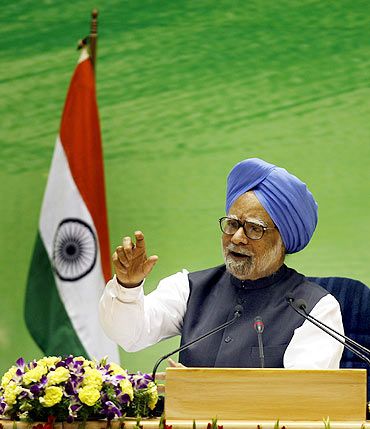
A member of the Standing Committee says, "Non-Congress parties are opposing the idea of the prime minister under the Lokpal more."
The Congress party has said the prime minister should be investigated by the Lokpal only after s/he demits office. The BJP wants the prime minister's post under the Lokpal, but with several caveats.
A senior member of the Standing Committee told Rediff.com, "If you ask me to put my hand on my heart, I can share that no political party wants the Lokpal and surely we don't want the Jan Lokpal. But inside the committee everyone is talking about 'people's pressure.' That has moved the debate on the Lokpal so far, so fast and so well."
This MP informed Rediff.com that many political parties are already saying privately that let the Lokpal Bill come, Parliament can later, surely, make amendments to it.
If the Constitution can be amended so many times, why not the Lokpal bill, these MPs say.
One contentious issue is how and who should select the Lokpal.
The Standing Committee is set to recommend a unique formula in which the prime minister, the Chief Justice of India, the Speaker of the Lok Sabha and the Leader of the Opposition will be the four members of the panel that will select the Lokpal.
In addition, one more nominee will be selected by a panel consisting of the Chief Election Commissioner, chairman of the Union Public Services Commission and the Comptroller and Auditor General.
Please ...
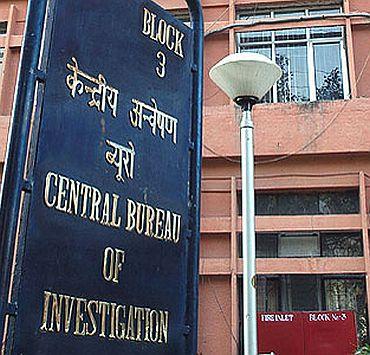
On November 24, 25, the Standing Committee is likely to decide if non governmental organisations and the media should come under the Lokpal's purview.
Committee members have agreed that the conduct of MPs inside Parliament will not be subjected to the Lokpal's scrutiny, but their dealings outside the House will be covered by the Lokpal.
As the final version of the Lokpal Bill is being given shape by Dr Singhvi, whose office has already finalised some nine chapters, it is clear that it will not be accepted by Team Anna.
The Standing Committee is likely to decide that the CBI-Chief Vigilance Commissioner and Lokpal should have a 'balance of power' that should eventually help fight corruption.
But Team Anna sees this as a ploy by the government to maintain its control over the CBI. This issue may be enough for Team Anna to hit the streets once again.
Dr Singhvi had divided the Lokpal Bill into some 15 issues. Political parties have different views on each issue. According to a BJP MP who is a member of the committee, "On many crucial issues, the UPA does not have a majority inside the committee and these political parties are unlikely to support blindly the Congress's version of the Lokpal. On many issues the NDA is backed by the Samajwadi Party."
Dr Singhvi thinks it is nothing short of a miracle that the Standing Committee has worked at such a swift space.
"In the ultimate analysis," he says, "the parliamentary committee is answerable to no one, except to the Indian people, the collective conscience of the nation and the national interest."